Final blog
/in Berlin, Germany Fall 2025 WagnerAs I write this blog, I am facing my final challenge of this long, adventurous semester. So while I spend my last few hours here in Germany, hoping to make my connecting flight home, as my first flight was delayed a little, I am able to do some reflecting and write this final blog before I am back home.
So first, I would like to reflect on my proudest moment this semester, which actually happened very close to the end of the semester. I was walking in an S-Bahn station and saw an old German couple looking confusedly at a map. I asked them if they needed help finding where to go, and then I was able to show them the way. And afterwards, the old German lady thanked me and said that she is my Oma now. I was proud for many reasons, first that I was able to do it all in German, and also that I had learned Berlin enough to be able to show them the way.
Secondly, I was thinking if there was anything that I could have done differently. Honestly, I am very content with how the semester went. However, maybe I would have been honest with myself from the start and would have known that I would have needed another bag coming home. Instead, I waited until the last day to get a second one after finding my bag was 10KG overweight, and that was quite stressful.
Thirdly, I was imagining all the customs or habits that I might bring back with me. Mostly I know that I will probably keep saying some of the phrases that I have picked up here, such as “Keine Ahnung” which means I have no clue. I also hope to bring gardening back with me. Many Germans have a garden, just a small one on their balcony or in the back yard, and I really like that idea. One thing I will not be bringing back with me is air drying clothes. They feel really weird, especially towels, when they are air dried vs using a dryer.
I am grateful for a lot of things in my study abroad experience. I am very thankful for my hosts, Elvira and Attila. They made my experience so great. I loved being able to speak German with them and learning from their experiences. They also cooked me really yummy food, which I enjoyed. Overall, I would say that staying with a host family was the best way to live abroad. Another thing I am thankful for is how much I was able to travel. I saw so many cool and new places, and did it all with my friends Caleb and Reba! The last thing I am thankful for, which also ties in with how I saw God’s hand during this semester, is that I am still safe and sound. Being abroad is always risky business, and I am thankful that I know God is watching over me.
Not often on this journey, but a couple of times, I found myself in a less than desirable position and felt a little unsafe as to where I was. However, every time afterwards, I was thankful knowing that the Lord was with me and grateful that he kept me safe.
Sorry for the interruption.
But I would like to inform you that I have successfully overcome my final challenge of study abroad; after taking two buses, two trains, and four planes, I am finally home. The whole thing took 32 hours. But never the less, my bags did not come with me. Hopefully, I get them back soon.
Also on study abroad, I experienced some unexpected blessings. Number 1 being how closely I grew together and learned about the friends I was traveling with. Study abroad really allowed me to have more conversations and a much deeper understanding of my friends that I would not have had going to school with them regularly. I really think that even though study abroad is over and I will no longer be as close with them as I was on study abroad, I really believe these connections will last. Surprise blessing number 2 was that I was exposed to so many different ideas; both from german culture and from other Americans in the FU-Best classes. I really feel that these ideas opened my eyes to how people not in my circles view the world. I think that while my own opinion hasn’t changed much, with this new knowledge, in the future I will be able to more effectively share the gospel with people of these views.
Finally, I’d like to give advice to the future students of the MLC study abroad program. While they might be able to find advice here and there in my previous blogs, I’d like to give my pinnacle number 1 recommendation. That is, to bring friends. On the one hand, a lot of people think that studying abroad is an opportunity to go on your own adventure. These people might think that they will meet tons of wonderful new people and have a great time exploring. While this is a possibility, I’d assert that it is a rare one. Often talking to my host, she commented on how many past students didn’t do much besides come home from school and watch Netflix in their room. So I pose the question: what did they do on study abroad that they couldn’t have done at home? I also talked to other students doing study abroad who came by themselves, and they talked about 1 of 3 things: not doing much, traveling alone, or not liking the people that they met while on study abroad. I systematically avoided all three of these problems by having two friends with me. Just like new people, you don’t always like your friends, but you always love them. Two friends meant that I always had something better to do than stayin my room. One of my favorite restaurants in Berlin, a make-your-own ramen place, was only found because of one of my friends. In addition, I would have never found some of the coolest cocktail bars in Germany if I didn’t have friends to go with. Traveling with two friends, ones I plan to keep in contact with, made every weekend trip carry more meaning because I did it with other people that are dear to me. I look forward to laughing over these memories with them in 10 years.
I am so happy that I chose to do study abroad. It was 183% worth it. And I’m so thankful to everyone who made it possible. Between my teachers and staff at MLC, who encouraged me and helped coordinate it, my host family, who willingly accepted me at their house, and God, who kept me safe, my parents, who came out to visit me, and finally, I’d like to thank my friends, who it wouldn’t of been the same without.
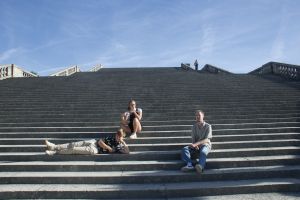
My Friends
Blog #8 Goodbye, Farewell, and Amen.
/in Limerick, Ireland Fall 2025 KopplinDrum roll, please! Bda da da da da… This is the final blog! Blog #8. The blog of reflection, accomplishments, stories, and blessings. Today, December 18, 2025, marks day 110, and a great deal has happened in that time. Besides Limerick, I got to see parts of the Aran Islands, Dublin, Galway, and the most recently, London, where Katie Gilkey and I got to see Trafalgar Square (more on this later) and see The Phantom of the Opera Musical and from box seats (so cool!), and The Nutcracker Ballet. We also visited Pooh Corner, a tea house and small Winnie-the-Pooh museum. No one else could have had the London adventure we did because we were a bit spontaneous. If we saw a sidewalk lit up by Christmas lights and a bunch of people on the other end, you bet we walked over to see what it was. We found a few cute Christmas markets and food stands and took a picture by every Christmas tree we saw. We visited rooftop gardens and traveled the English countryside by train.
I haven’t been everywhere or seen as much as others, but I got where I wanted to. It’s not about doing what everyone else does or getting to the most places. It’s about the adventures you make and those you make them with. This semester, I had the opportunity to meet and live with two lovely ladies, and I made more memories with an old friend. We’ve added many more laughs and inside jokes that we can look back on for the years to come.
What are you most proud of?
I am proud of my cooking accomplishments in a kitchen that doesn’t have everything, and having to make do. I’m proud of figuring out how to grocery shop in unfamiliar stores. I’m proud of learning (not quite mastering) public transportation and being more active and going for walks.
I am most proud of getting out of my comfort zone and being okay when things are a bit uncomfortable or new. Getting out of your comfort zone is a healthy and beneficial practice. Not only does it encourage personal growth, but it also broadens your perspectives, enabling you to relate more to others and understand their situations more effectively. It can also increase resilience, enhance problem-solving skills, and boost confidence. I can confidently say I have seen all of these in myself over this last semester. I challenge you to intentionally find one thing to do before the end of the year that makes you a little uncomfortable and do it. Tell it to one other person to keep you accountable. Afterwards, be proud of what you accomplished. You don’t have to like it in the end, but at least you are certain of that now, and at least you tried. Learning and growth come from reflection.
What would you do differently if you could?
Nothing. I don’t want to change anything. It’s not because everything was perfect. No. I don’t want to change anything because this was the adventure God had planned for me. I had to experience the adventures and challenges because I have learned and grown from them. Have I changed a little? Yes. Am I completely different? No. Would I have learned the same things if I hadn’t studied abroad? I don’t know. I won’t ever know. It’s our experiences and adventures that shape us. It’s the path of life God has laid out for each of us, and the people he brings into our lives that help make us who we are.
What will you incorporate into your life back home?
Compost. No, I’m not bringing rotting food scraps back to the States. Gross. Why would you think that? What I mean is that I want to be more aware of the environment. Ireland does a better job of maintaining a clean environment and preserving the land. They have compost bins/dumpsters like we have regular trash and recycling collections every week. I loved working in the garden when I was younger, picking and eating the fresh fruits and vegetables. Although I don’t have my own garden, I hope to someday when I can recycle food scraps.
Lighter schedules. Or the attempt at it. Why do we always feel rushed? In my last blog, I mentioned that I was thankful for lighter class schedules and how they give you room to simply be. America is a doing culture, always moving from one thing to the next. Ireland is more of a being culture, where people take personal time to socialize or enjoy alone time. I know it will be challenging, but it will be another goal to work towards. I want to be more intentional about setting aside time to relax and take a pause. I think this is something we should all strive for and is often overlooked in life at MLC.
What are you most grateful for?
I am most grateful for my sweet Michael. ❤️ Why? Because he’s him. And I love him that way. I have missed him a lot. 8 days, by the way. 🙂 He’s always made time to call and spend time over the phone. Sometimes it’s to chat, do homework together in each other’s presence, watch a movie, or even fold laundry with me. I can’t wait to be able to give him a hug and kiss, hold his hand, or go for a walk together. He’s listened to all my stories and challenges along the way and encouraged me to do my best, and he’s proud of me. I’m proud of him for all his determination and effort he put into this semester at work and school. I love you, Michael! See you soon! ❤️
How have you seen God’s hand in your experience abroad? What unexpected blessings or provisions have you seen?
We have met many people from all over and had the opportunity to explain what MLC is, how our system works, and how Katie and I met in high school in Wisconsin, despite being from Nevada and Texas and attending college in Minnesota. A year before Katie and I left for Ireland, we felt a big pull to study abroad, and that there was someone we had to meet. We don’t know why we felt this mission; maybe it was God putting this on our hearts. Although we’ll never know for sure who this was, we had to meet, and now that we have reflected on our time and the people we’ve met, we think it might have been one of our housemates who needed big sister advice and encouragement.
An unexpected blessing was getting to sing Christmas carols in Trafalgar Square during our first evening in London. It’s been a while since I’ve been able to go caroling, and I didn’t realize how much I’d missed it, even just getting to sing the traditional Christmas hymns. We were just about to leave when I overheard the small brass band from the other side of the square, amidst all the commotion of hungry shoppers. I quickly sought out the music, eager for what I might find. We weaved our way through the crowd—we got really good at this over the next 3 days in London—and found the musical group. To our surprise, we also found the carolers. After making our way to the front of the crowd to see and hear better, and unable to contain the joy, we joined in with the songs we knew from memory. We found a seat up front, and during one of the free-will offering collections, the church lady invited us to join their group. They even had extra music folders for us to use. We had a blast. We sang some of the classics, new melodies with familiar lyrics, and familiar melodies with variations in the lyrics. We didn’t realize how much we needed it until we were in it. This was our favorite part of our trip to London. 🙂
What advice would you give to future semester-abroad students?
- Plan things, even small things like a day in town or a different part of town, to look forward to and get excited about the next big adventure. The little motivation and things to look forward to really help keep the time moving and prevent getting down.
- Ask the locals for good places to eat or visit. Nobody knows the lay of the land better than they do. Ask your teachers and other people you meet about places they might suggest.
- Find a buddy abroad. This is more fun with a friend to make memories with. But it’s also good to get out and do things on your own.
- Ask questions… and be ready to get a vague answer. Ireland’s communication style is more circular than straightforward. It may take some probing to get the answer you’re looking for. Keep asking questions and be specific.
- Track the weather for your location the year prior to your study abroad semester. This will be particularly helpful when packing, taking into account factors such as rain, humidity, and wind.
It’s been an amazing experience studying abroad and immersing myself in a different culture! Thanks for keeping up with my posts and reading about my adventures. I still have so many songs I wish I could share. So for this last one, I’ll let you choose your own adventure! Listen to one or listen to them all! Merry Christmas and Happy New Year!
“Time to Go Home” By JigJam
https://youtu.be/BXx0NzjaLfI?si=rtC1cLOQq-gXbmLl
“Christmas in Killarny” (and the rest of the album) sung by Rend Collective
https://www.youtube.com/watch?v=SqIMZGbkbbo&list=PLGXQK3aC61FQ2TtOR3UIXKhQBHheVQ6fH&index=2
“Hurray for Christmas Day” (and the rest of the album) by The Irish Rovers
https://www.youtube.com/watch?v=HYgjsD20UQI&list=OLAK5uy_kaQrlpp_TovhT1_7VZD0feBeGNhf6hsrU&index=2

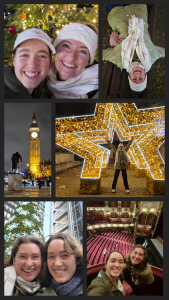
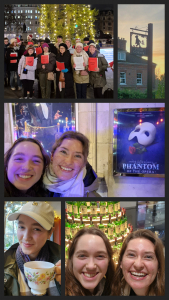
Blog 8 – Slán, Surrender, and Serendipity
/in Limerick, Ireland Fall 2025 GilkeyOh, friends…hello again! We made it (with a sigh of thanksgiving, joy, and a hint of sadness)…
I am absolutely flabbergasted at how quickly my time abroad has flown by! At the beginning of this experience, it felt as though I had endless time to explore, learn, adventure, travel, and create memories. When all of a sudden…I think about the next few days and realize that I am officially moving out of Plassey Village. Does that ever happen to you – you know, where you feel like you blinked and the pages in your precious book of life are turning before you can even comprehend what is going to happen next? I can certainly say that this is what my brain is going through at the moment, but I could not be more thankful for this opportunity and EVERY piece of knowledge, growth, wisdom, and memories made on this adventure! This blog is dedicated to some of my personal reflections regarding my entire experience. Thank you for reading this last blog and sharing your time with me – especially if you have been kind enough to read all of my silly goofy, long blogs! 😅
Indeed, I have been incredibly blessed to have had such an experience. There is so much wisdom to be gained by just looking around and talking to people who come from differing backgrounds – these become treasured nuggets of knowledge and often lead me to feel immense gratitude. I will never stop encouraging others to look for all of the things that we can be grateful for in this life. They are abundant, boundless, and ready to be seen. I challenge you to reflect and find things in your daily life that you can be grateful for…and never stop!
Here are three things that I am grateful for from the past few weeks:
- Personal Time With God (He always seems to know exactly what I need to hear in the right moments – we have such an INCREDIBLE God!)
- God Winks (I have had countless moments in the past weeks that I would consider ‘God Winks’ – moments that God seems to smile upon you in unique ways)
- Christmas Movies (I just love this time of year when I can curl up on the couch and watch Christmas movies while drinking coffee and being cozy, such a vibe 😄)
As previously mentioned, this blog aims to be a cumulative reflection of my experiences in Ireland. Through a series of questions, I will attempt to elaborate on some of the profound moments I have experienced abroad and invite you into my thoughts. Perhaps these are questions that you can also use to reflect on some meaningful moments in your own life!
Question #1: What are you most proud of?
Answer: Surrender
Well, what about you? What are you most proud of in your life? I don’t know what your answer is, but when it comes to my Study Abroad experience, I am most proud of a key life concept that I am continuously trying to improve upon, daily…surrendering myself to God. I can definitely say that I would have never thought at the start of the semester that this would be my ending answer to this question, but here we are!
If you had the opportunity to read my previous blog, you may recall that I admitted to having a problem with the need for control in my life. I like to know what is happening, when things are happening, why they are happening, and every detail in between. (Maybe you can relate to that…) But being here in Ireland, I have had to embrace the idea of adventure, spontaneity, and surrender. Due to being in a different country with things FAR beyond my control, I had to quickly learn to be okay with absolutely anything and everything! From silly bus moments and miscommunications to school work and personal growth, everything came down to me turning to God and asking Him to help me surrender myself and the things in my life to Him, and Him alone.
There was a moment that I had with God just the other day where I had a real heart-to-heart with Him about my future. I have been feeling incredibly conflicted for quite some time, but through sobbing, prayer, and surrendering, I felt a veil of God’s grace and the peace that passes all understanding, drape over my mind and body in a way that was so touching that much of my anxiety dissipated in an instant. There is no need for control when absolute perfection is already in control of my life. This has been a missing puzzle piece in my mind for a while, but God is good all the time, and all the time, God is good! He promises to be with me, to guide me, to bless me, to forgive me, and to show me the way in Jesus’ name – and he promises these same gifts for you too! I can now surrender to Him with joy (which has been a goal that I wanted to accomplish), and I am proud of myself for overcoming this adversity by looking to our Wonderful Counselor, Everlasting Father, and Prince of Peace.
Question #2: What would you do differently if you could?
Answer: Travel More
I know that may sound silly to you, that I wish I had traveled a bit more (considering I traveled to a different country to study), but I wish that I had had more time to travel outside of Ireland. When choosing my modules at the beginning of the semester, I had options to choose classes that would fall on Tuesdays, Wednesdays, and Thursdays, which would have left me with four-day weekends each week. Those weekends would have been the perfect time for me to travel outside of Ireland to the surrounding countries and gain a better understanding of European culture, thereby expanding my perspective.
Initially, when I wanted to study abroad, traveling all over Europe was a main goal of mine; however, it became less feasible once I selected my modules for the semester. I made the choice to proceed with my chosen modules and give up my travel time, but I don’t regret it. If I could go back to the beginning, I would probably still have chosen the modules I did because I gained immense knowledge from my classes, but I would have thought more carefully about whether or not I was willing to give up potential travel time.
This past week, Laura and I traveled to London for a few days, and we had an absolute blast! We decided to be spontaneous with our time, but that led us to make incredible memories and try new things! We had to learn the new public transport system and find our way around the city, pushing us out of the comfort zone of Ireland! Upon returning from this fabulous adventure, I have been thinking about how many stories we could have made if we had traveled outside of Ireland a bit more. However, the Republic of Ireland is a stunning place with many hidden gems that we got to experience, as we spent the majority of our time in the country.
Question #3: What will you incorporate into your life back home?
Answer: Daily Routines and Habits
The semester before coming to Ireland, I was an absolute disaster. I was taking far too many classes, involved in too many extracurricular activities, and I was not taking care of myself as I should. There were nights when I got the least amount of sleep, only 30 minutes. That is not good. I was having issues with hair loss and a variety of other symptoms indicative of someone who was not caring for themselves.
Coming to Ireland, I was hoping to use this time as a complete “Katie Reset”. I can say with joy that I have most certainly accomplished this task of a “Katie Reset” – thanks to a gracious God! Do you have any daily routines or habits that you just cannot go a day without doing? Up until this point in my life, I hadn’t experienced these daily refresh moments, but I can attest to the fact that they are marvelous and exactly what I need to stay focused, motivated, and healthy.
Over the course of this semester, I have implemented 6 daily habits into my life that help me to “just be” in the moment and care for myself mentally, emotionally, physically, and spiritually!
- Morning Devotion – I start my day with a Bible reading, devotion, and prayer with the intent of keeping God at the forefront of my mind from the very beginning of the day!
- Afternoon Devotion – At some point in the mid-day, I give myself the gift of more time in God’s precious Word! I use the Bible App on my phone to contemplate the verse of the day and say a few prayers!
- Night Devotion – I end my day with another devotional book that has a verse, a reading, and a prayer. I use this as the last thing my eyes look at before I close them to sleep.
- Read – I love personal reading time, but I have never given myself the grace to “read for me” in the middle of a semester. So, I give myself 10-15 minutes to read for fun each night before bed!
- Journal – Right before my personal reading time, I write in my prayer journal. Basically, it is a long, written prayer to God that details everything that happened in a day and that is on my heart and on my mind! It’s a beautiful way to connect with God and let myself not hold onto things that are weighing me down – surrendering them to God!
- Workout – I strive to give myself a workout of some kind every single day. Workouts have included walking, dancing, pilates, and yoga. No matter what, I strive for some form of daily movement.
I challenge you to think about things that can help you to care for yourself and “just be” for a few moments, even when life is absolutely crazy, living in a “doing” culture!
Question #4: What are you most grateful for?
Answer: Irish Dancing
I know, complete shocker!! 😆 But, it’s true! I could not be more grateful for God giving me a semester where I had the opportunity to dance all the time! I didn’t really realize just how much I had been missing dance and how happy it makes me until I got to dance every single week for 3 days!
I know that I have mentioned this in a previous blog, but a few years ago, I had a doctor tell me that I needed to stop dancing. He told me that my body couldn’t really handle the amount of dance I was doing anymore, and it absolutely crushed me. If I could dance every moment of every day with no pain, I would! So when I was told this news, my world shattered, and I struggled with an identity crisis, a career crisis, and feeling like my world was upside down. I have endured those thoughts and feelings regularly for the past two years. But after having time in Ireland to reassess my situation and the gifts that God has given me, I have been able to find peace and joy.
The festive, social dance qualities of Ceili dancing make this type of dancing something that I can do with relatively little pain. Having the opportunity to work closely with my Professor, Pam, this semester and to learn so many incredible Ceili dances has given me the opportunity of more permanent dance capabilities for my future! I am grateful to God for showing me what I can do with my body in the realm of dance and for giving me the gift of movement that brings me incredulous joy!
Question #5: How have you seen God’s hand in your experience abroad? What unexpected blessings or provisions have you seen?
Answer: God Winks
Wow. There are so many facets to these two questions that could be explored, but my most concise answer is: God winks. God’s marvelous, all-knowing hands have been an integral part of this entire experience. I have had monumental conversations with various individuals about God and His undying love, which are undoubtedly guided and touched by the Holy Spirit. I have embarked on many new opportunities that pushed me out of my comfort zone, and God wonderfully blessed each and every one of those circumstances. When I was feeling uncertain, anxious, and stressed, God provided me with people in my life who could rebuild me and point me back to Him. There were times that I found mini notes of encouragement in my daily planner or that I opened a letter with the exact words that I needed to hear in that moment, and without a doubt, God was behind all of it.
God was with me in every moment of every day and in every step that I took. No matter what I was doing or where I was going, I could always reflect back on an experience and see how God was working in my life! There are too many of these scenarios to count or to share with you, but I ask that you trust me when I say these things – God is unbelievably good.
For one of my modules, I had the opportunity to craft and teach an English as a Foreign Language (EFL) lesson to a group of Ukrainian refugees at the UL AccessCampus. At the beginning of my teaching practicum, I was really unsure of what I was getting myself into and I wasn’t feeling super excited about it. But throughout the process, it was undeniable how God was using this experience to broaden my perspective and help me to be more passionate about the power of movement than ever before!
I decided to teach them a lesson using the theme of ‘Movement and Feelings,’ and I taught them the “Cha Cha Slide”. From there, I used the lexis from the lesson to have them tell me how they felt while dancing. This whole opportunity became something that touched me deeply. These were the words that I used in the end of my reflective report from this experience:
“There was a moment while everyone was dancing the “Cha Cha Slide” when I looked around the room and saw smiles on everyone’s faces. I felt electric energy surging through the room. It was an unreal moment. Yet, it was a moment that confirmed my deepest beliefs and passions regarding the power of movement. When everyone walked into the classroom that day, there was a sense of weight held within the air. As the lesson began, the weight continued to linger, yet it began shifting. It was in this auspicious moment while dancing that this weight dissipated into the atmosphere. Everything about class from then on changed. The students spoke about how dancing made them feel “energized,” “excited,” “amused,” and “delighted.” This confirmed for me the immense healing power of movement—physically, mentally, emotionally, and spiritually. This moment and this entire teaching experience will be a treasured memory that I will hold with me in my heart and in my mind for the rest of my life — I am truly grateful.”
Truly, I am grateful. This teaching practicum was an unexpected blessing that I could have never imagined. The thoughts that I had regarding movement and how this experience connects so deeply with my passion for Dance Movement Therapy were undoubtedly a God Wink. This is just one particular example of how God has been at work in my life this semester, and I could not be more thankful to have a God who cares so much about each and every one of us.
Question #6: What advice would you give future semester abroad students?
Answer: Just Try
For any of you who are looking to study abroad (or try something completely new), my advice for you is sweet and simple: just try. Allow yourself to be led by God, surrender to Him and His wondrous plans for you, and just give everything a whirl! You will never know if you don’t try! Let yourself be okay with being comfortable in the uncomfortable. Put yourself out there. Talk to people – you never know what kinds of conversations you may have and who you may be able to share Jesus with! 🙂 Try new things: new extracurricular activities, new modules, new food, new travel, new transportation, etc. Without a doubt, my greatest experiences while being abroad have come from me doing things that I have never done before, and in the past may not have ever considered doing. Let yourself be curious and follow the line of curiosity until you reach the very end of the rope. Most of all, know that God is with you every step of the way, blessing you, guiding you, loving you, forgiving you, and providing for you – you are never alone, and you are always loved by your Creator and Savior, Jesus Christ! Keep Him at the center of everything you do, and He will bless you!
Highlights from these past weeks include:
- House 35 Thanksgiving Celebration (we made a small turkey breast, mashed potatoes, green bean casserole, stuffing, and pumpkin pie to celebrate)
- End of Module Assessments Complete (I have officially finished all projects, performances, exams, reports, presentations, and teaching practicum opportunities)
- My TESOL Practicum (my teaching experience with the Ukrainian refugees was an unexpected delight and a forever, treasured memory!)
- London Trip (Laura and I went to London and were able to embrace many, many opportunities! We got invited to sing Christmas carols in a church choir that was in Trafalgar Square – an unexpected blessing and God knew that my heart needed that! We saw many of the sights of London, went to the National Gallery of Art where we saw art from Van Gogh, Degas, and Monet, went to Phantom of the Opera on West End, went to Pooh Corner just outside of London – a quaint tea house dedicated to Winnie the Pooh, saw The Nutcracker Ballet at the London Coliseum, and ended our time by attending the WELS London mission for church on Sunday!)
- PVA Award (I received the Silver President’s Volunteer Award for volunteering 44 hours to a variety of organizations on UL’s campus over the course of the semester)
Low-lights from these past weeks include:
- End of Semester Stress
- Feeling Helpless
- Overcoming Sickness
Learned Insights from the Low-lights:
- You know it… you’ve felt it…it’s (drum roll please!!!)…”END OF” STRESS! No matter what your life has looked like, I can guess that most people have experienced that heightened sense of stress at the end of a month, year, semester, etc. And yep, you guessed it, that has been what I have been feeling these past few weeks. Sometimes the work feels never-ending, and it is so frustrating to feel like your feet are constantly stuck in marmalade! 🙄 Yes, these are true feelings, but how can we flip the switch and find the good? Well, if we are feeling these feelings, then we are likely people with jobs, an income, food on the table, an education, or a variety of other blessings that some people in the world could only ever dream of – maybe this stress can become a gratitude after all?!
- Unfortunately, while I have been abroad, some of my family members have not been doing well with their health. One family member is currently in the hospital and things are not looking the best. It is really, really hard to be away from home at such a large distance and hear about these challenges. At many moments, I feel completely helpless and sad that I can’t be there or do anything for anyone. But the reality is that even if I were home, there is still nothing that I can really do because everything is already in God’s loving hands, anyway. This takes us right back to my section on surrender. In these challenging moments in life, there is nothing more that we can do than look to God for peace, strength, and comfort. Through prayer and surrender, God will take care of everything according to His good and gracious will, and we can rest in that comforting thought.
- While Laura and I were in London, our terrific housemate, Nessa, came down with a pretty serious illness. She is doing much better now, but we are all doing our best to care for our bodies and not catch what she had. You know that feeling when someone in the house is sick, and you don’t want to get it because you have something coming up that you don’t want to miss, so you are ‘walking on eggshells’ around the whole house and finding every possible natural remedy in existence to try not to get sick? Maybe you have had this experience, maybe not, but I am here to tell you that this has been our experience! To flip the switch, in moments of sickness, it makes us that much more grateful for the times that we do have our health. We really can’t do a whole lot if we are not healthy physically, mentally, emotionally, and spiritually – another amazing reason to establish daily self-care habits and routines! 😉
Scripture that has been with me these past few weeks:
- John 14:27 – “Peace I leave with you; my peace I give you. I do not give to you as the world gives. Do not let your hearts be troubled and do not be afraid.”
- Romans 15:5 – “May the God who gives endurance and encouragement give you the same attitude of mind toward each other that Christ Jesus had.”
- 1 John 4:19 – “We love because he first loved us.”
This has been an incredibly blessed semester, in more ways than I could possibly ever recount. I felt a strong pull and calling to be here, and I have often wondered why. Now, I am leaving here, and I know for a fact that God has used me in His precious plan. There is nothing serendipitous about the fact that God placed me exactly where He needed me at exactly the right time. It brings me endless joy to know that I have served God to the best of my ability while I have been here. I have learned so many things about myself and others, and I have grown in unimaginable ways. I am truly thankful for this experience and for every single person in my life who has helped me, supported me, and encouraged me on this journey – I could never have done it without you! May the Lord bless and keep you always!
Until I see you again, Slán! (Hehe, that’s Irish for “Goodbye” – I just thought you might want a little something extra! 😁)
Okay…for realsies this time… 😋
Peace, Love, Joy, and Jesus,
With Endless Amounts of Joy and Love,
Yours Truly,
Katie Gilkey
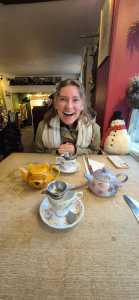
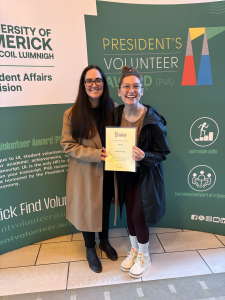
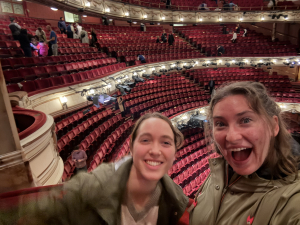


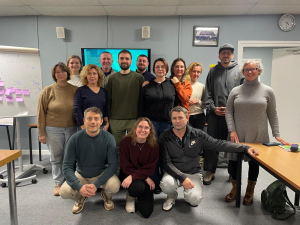
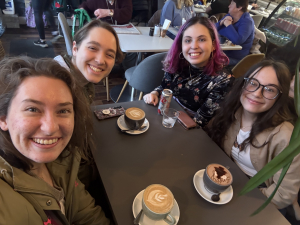
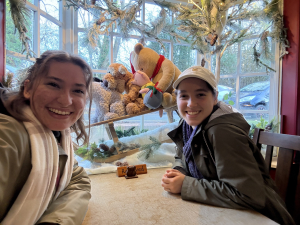

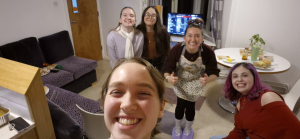
A Life Changing Experience
/in Berlin, Germany Fall 2025 MunsonI can’t believe this experience is over! Throughout this whole experience, I feel like I have learned so much about the world and about myself. I can’t even begin to explain how thankful I am to have had this experience. It was truly incredible.
I’m really proud of how I learned to adapt to different cultures, and even more so, how I grew to enjoy everything that came with that. During study abroad, I got to visit and see so many new places, in and outside of Germany. Germany, my host country, I grew to miss when I was not there and feel comfort with when I returned. Perhaps the most different culture I experienced was Morocco! I loved Morocco. Not only did it challenge me to grow more in my independence, but it also really showed me how inviting people can be. Throughout all these moments in all these countries, I learned more deeply what my limits where and what I was comfortable with, and I’m really proud of that. That’s something I would not have learned if I hadn’t exposed myself to those cultures and experiences.
I really don’t have anything I would have done differently with my time during study abroad; however, I do think it would have been wiser if I had watched my money more closely and tried to save money where I could. I realized towards the end of my time in Germany that I could have budgeted better. That being said, I wouldn’t trade any of the experiences I had during study abroad, and, despite the cost, there are so many experiences that go so far beyond the monetary value.
I hope to continue and keep the mindfulness I gained while in study abroad, especially mindful of people and the value of the relationships you have with people. My host mom really made an effort to make everyone feel welcome and loved that walked into her home, and, let me tell you, it made all the difference. As soon as you walked in the door, you could feel that you were in a safe place where love was present. I hope to carry that with me for the rest of my life, and hopefully have people think of that when they think of me.
There were many times during study abroad that I saw God working in my life. Whenever, I was stressed there was always an answer. Especially, in a place like Europe, where religion has been quietly dissappearing, it’s an interesting experience talking with people and gaining new perspectives. It’s all the little things that I tend to notice. Whether it’s a morning that I’m really stressed and all the buses make it on time, or impossible scenario that ends up getting resolved, God was so evidently working and taking four steps ahead of me, watching out for me in unkown places. I think back to Morocco, and how I was stranded there because my flight was cancelled. It was probably the most chaotic place I’ve ever been; however, there was always an answer and God gave me the calmness that I needed to get through the situation.
To all the future study abroad students:
Really take this time to experience and learn more about yourself. Even if you think that you already have yourself figured out, trust me, there is still so much that you will learn about yourself.
Go out and take advantage of every opportunity that you get! Living in Berlin, the city is so alive no matter what types of interests you have. Go out and have fun! You are young and have the capability in your life right now to go and live out this experience to the fullest. Go do that and come back with so many stories and memories.
Spend time in your host culture and really learn the ins and outs of it. You might find a specific aspect of that culture that you really enjoy and take that back to America with you! I learned to really love the trains and transportation in Germany, as well as the spa/sauna culture in Germany, which is something I would never have thought I would’ve taken such an interest in, but when I gave it the chance it became one of my favorite things to do in Berlin.
Finally, study abroad will change you. Cherish and enjoy it all. Take pictures. Journal your thoughts.
So that one day, when you’re older, you can look back and see what an awesome time you had in that time of your life.
This is Caleb, signing out.
Tschüss!

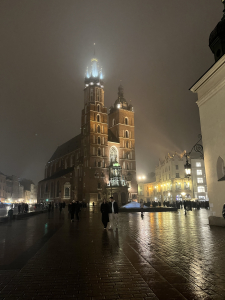
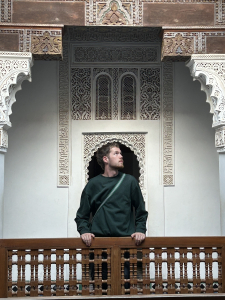
The End of the Rainbow
/in Dublin, Ireland Fall 2025Oh boy, where to even start. As I sit here, munching on cold noodles and procrastinating on my finals, it’s strange to think that I’ve already been here for 11 weeks. Guys, I go home next week. I would say that the semester flew by, but it’s honestly been a real trek. Some parts speeding by in the left lane, yet others sitting in bumper-to-bumper traffic on the freeway. Anywho, let’s get into it.
Firstly, I would say that I’m proud of myself. This semester has been hard in many ways, but honestly, so rewarding. I’ve learned so much about myself and what I am capable of doing if I put my mind to it. I started off the semester knowing no one and feeling completely overwhelmed, and now here I am  taking random solo side quests into Dublin for fun. Side note, why are second-hand stores here basically all consignment stores? What does it take for a girl to find a good thrift store that isn’t curated and generally overpriced? Just something to add to the list of things that I miss about home, I guess… Anywho, I’m just generally so proud of how much my independence and confidence have grown over this semester. I have grown to enjoy commutes and reclaim my love of looking out the window and generally just observing the world around me. I’ve spent lovely hours walking around Maynooth and Dublin with no real goal in mind, changing direction when I fancy and popping into places that pique my interest. I’ve enjoyed the time spent with my own thoughts, especially as I have become more and more comfortable with public transport. When I first got here and started using buses and trains, I would worry from the time I planned out my trip to the time that I got back to my apartment that something would go wrong. Now I’m actually able to enjoy it without constantly fretting that I missed my stop or that I got on the wrong bus. (Please enjoy the festive lights of Stephen’s Green Shopping Center, the final destination of one of my solo adventures.)
taking random solo side quests into Dublin for fun. Side note, why are second-hand stores here basically all consignment stores? What does it take for a girl to find a good thrift store that isn’t curated and generally overpriced? Just something to add to the list of things that I miss about home, I guess… Anywho, I’m just generally so proud of how much my independence and confidence have grown over this semester. I have grown to enjoy commutes and reclaim my love of looking out the window and generally just observing the world around me. I’ve spent lovely hours walking around Maynooth and Dublin with no real goal in mind, changing direction when I fancy and popping into places that pique my interest. I’ve enjoyed the time spent with my own thoughts, especially as I have become more and more comfortable with public transport. When I first got here and started using buses and trains, I would worry from the time I planned out my trip to the time that I got back to my apartment that something would go wrong. Now I’m actually able to enjoy it without constantly fretting that I missed my stop or that I got on the wrong bus. (Please enjoy the festive lights of Stephen’s Green Shopping Center, the final destination of one of my solo adventures.)
That all being said, the semester hasn’t necessarily been what I expected it to be. Do I wish that I had pushed myself to use public transportation sooner? Or forced myself to use some of my time more wisely rather than wallowing in my room? Yes and yes, but I can’t go back and change the past. All I can do is be introspective and learn from those experiences by making different choices in the future. Of course, that is easier said than done, and I would be lying if I said that I haven’t already antagonized over certain things, but I have to look at it with a more positive attitude. Make small and purposeful changes, and the results will encourage me to continue the journey. As a small example, the other day, I had planned to stop in my professor’s office to discuss an exam, but I was really dreading it and was seriously considering just winging the exam . Once I actually got to the meeting, however, it turned into an hour-long conversation that simultaneously answered all my questions about the impending exam and was a genuinely great chat. Choosing things that are initially difficult or challenging is not one’s natural instinct, but they really are the most rewarding in the end. That is something that I will always remember, especially after this semester.
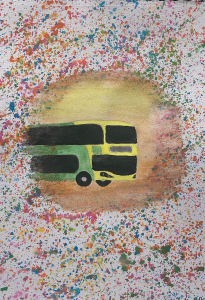
There are many things that I’ve learned over the past few months, and I hope to incorporate many of those things into my “normal life” back home. I’ve had such a great time starting new healthy habits- being intentional about being physically active every day, beyond my regular movement to and from class, listening to sermons while I’m on my walks, giving myself brain breaks by painting rather than scrolling, and generally making small but difficult steps in order to meet my goals. I’ve also enjoyed embracing my own style and artistic eye while I’ve been abroad, picking up art that intrigues me and experimenting with outfits that have been out of my comfort zone in the past. On top of that, catch me embracing scarves and tote bags. I’ve realized that I am my biggest critic and that I should make an effort to impress myself and quit worrying about what other people think of my outfits. Spoiler alert to all the self-conscious people out there, no one is looking at you; they’re just worrying about how they look. Kind of a vicious cycle, huh? (And boom, my artist rendition of a Dublin bus breaking into a splatter painting.)
I’ve been grateful for the opportunity to experience the world through a whole new lens. A foreigner with practically no connections, except for a shared language and roommates I’ve just met. That sounds drastic, but it was honestly quite scary at times, especially near the beginning, as I was learning to navigate this unfamiliar culture. I’ve found that my empathy for people, especially immigrants, has grown. It’s so easy to become frustrated with people who don’t already know how to do something that seems so simple to you, yet once one gets just a glimpse of what life is like in their shoes, the importance of patience and kindness becomes so clear. I’ve been blessed to have interacted with so many nice and patient people during my time here in Ireland. God has truly blessed me by giving me experiences that expand my limits, while still keeping me safe. This semester has taught me to take a breath and rely on him. Your computer just broke, and you got here last week… it’ll be alright. You’re feeling overwhelmed by your schedule planning…it’ll work out eventually. Oh no, the machine ate your £50 bill… it’s ok, you’ll get it back. You missed your train…there’ll be another. Problems feel less and less major when you look at the bigger picture. God has got this. It sounds cringey, but God is bigger than the world, and he has your best interests in mind, always. I know that I will always struggle with worrying, but God has refocused my life this semester. Don’t sweat it, it’ll all work out in the end. May as well just laugh it off and keep going.
If I were to give advice to those thinking about studying abroad, I would say to just try it. Push yourself to try new things even if they seem scary. Be the person to initiate interactions. Allow yourself to be  “awkward” in order to create connections and forge friendships. I’m not saying to always say yes. In fact, if you ever feel at all uncomfortable about something, trust yourself. Say no, turn around, call a friend, whatever, don’t just go along with it because you think that you’re overthinking it. Chances are that your gut is right. Another thing I would say is to explore as much as you can. I understand that finances can be tight and one cannot afford to be travelling somewhere every weekend, but take any opportunity you have. Explore the city where you’re studying and the country. Look for the small details that people often miss. Let yourself relax. Find a hobby to explore. Don’t let the fomo- fear of missing out- both abroad and back home bring you down. Don’t feel like your experience is worthless because you aren’t constantly doing something “exciting”. Finally, give yourself grace. You’re in a whole other country, learning to live life while also doing school. Jesus loves you, and he gives you the strength to keep going even through the tough days. (A cozy scene that I snapped a picture of while on one of my walks. I love the stained glass!!!)
“awkward” in order to create connections and forge friendships. I’m not saying to always say yes. In fact, if you ever feel at all uncomfortable about something, trust yourself. Say no, turn around, call a friend, whatever, don’t just go along with it because you think that you’re overthinking it. Chances are that your gut is right. Another thing I would say is to explore as much as you can. I understand that finances can be tight and one cannot afford to be travelling somewhere every weekend, but take any opportunity you have. Explore the city where you’re studying and the country. Look for the small details that people often miss. Let yourself relax. Find a hobby to explore. Don’t let the fomo- fear of missing out- both abroad and back home bring you down. Don’t feel like your experience is worthless because you aren’t constantly doing something “exciting”. Finally, give yourself grace. You’re in a whole other country, learning to live life while also doing school. Jesus loves you, and he gives you the strength to keep going even through the tough days. (A cozy scene that I snapped a picture of while on one of my walks. I love the stained glass!!!)

Whoa, this is a long one, I know, but it feels good to get all of that onto proverbial paper. I’ve experienced so much this semester, and grown in ways that I didn’t even know I was capable. I know that I will miss the environment I’ve grown accustomed to, but I look forward to sitting on my final flight back home after finishing my finals and reuniting with my family in person for Christmas. I just have a few finals, a couple papers, and a connecting flight in Amsterdam to get through before I can feel that peace. Wish me luck. ANYWHO, I gotta hit the hay and prepare for my American History exam. Who knew that American History class would be harder in Ireland??? Not to mention creating my very own *copy paper version* Irish manuscript… Yeah, your girl’s gonna be busy this week. Crossing my fingers that my bag isn’t overweight…
Peace and love!
Mathilde
